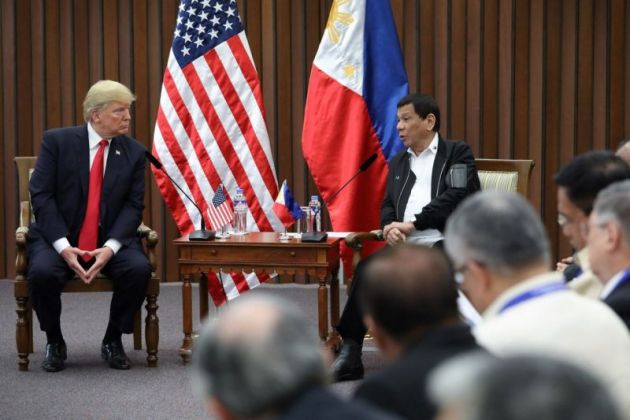Philippines president now says he will resign if someone proves the existence of God

Filipino President Rodrigo Duterte seems to fashion himself as the Asian echo of U.S. President Donald Trump with his fury often directed at the Catholic clergy in his country.
The Philippine president had recently sparked outrage for calling God stupid and courted new controversy in his largely Roman Catholic country by saying he will resign if anybody can prove that God exists.
Duterte questioned anew in a recent speech basic tenets of the Catholic faith, including the concept of original sin, which he said taints even innocent infants and can only be removed through baptism, The Associated Press reported.
He said if there's "one single witness" who can prove, perhaps with a picture, that they were able to see and talk to God, he would immediately resign.
The president thrives in his tirades about the church and its doctrines, in Asia's most Christian nation where most believers are Catholics.
His latest provocation to the Catholic Church when he said he would resign if someone could prove to him that God existed.
The proof he looks for could come in the form of a "selfie" or someone who was "able to talk to and see God."
He admitted that some kind of higher power must exist, otherwise the planets and stars would collide.
He succeeded in riling Philippine's Catholic bishops.
On July 9 they called for fasting and prayers after Duterte called God "stupid" and questioned God's existence.
His recent comments came weeks after he angered many by asking "Who is this stupid God? This son of a b**** is then really stupid."
Then he offered his opinion on the church's belief in original sin.
DUTERTE ON ORGINAL SIN
"You were not involved but now you're stained with an original sin ... What kind of a religion is that? That's what I can't accept, very stupid proposition."
The president's public comments about religion came after months of feuding between Duterte and Catholic bishops, many of whom have criticized his government's approach to dealing with the nation's drug problem, Christian Headlines reported.
Police raids and crackdowns have left thousands dead and the bishops lamented that many of the poor who died were counted only as "casualties."
Duterte also claims a long history of disdain for organized religion because of the abuse he suffered at the hands of a Jesuit priest when he was young.
He says he believes in God, but rejects any organized religion.
Duterte initially said he would not apologize for his remarks about God "in a million years," but then backed down from that assertion.
He remarked, "I only apologize to God, nobody else," adding, "If I have wronged God, he would be happy to listen. Why? Because my God is all-forgiving."
President Rodrigo Duterte has apologised to God for calling Him "stupid," a remark that has caused an uproar among members of the Catholic Church and other religious groups, philstar.com reported.
Duterte made the apology during a meeting with evangelist Bro. Eddie Villanueva at the Malago Golf Club in Malacañang on July 10, The Philippine Daily Inquirer reported.
"If it's the same God, I'm sorry, that's how it is. Sorry, God. I said sorry God. If God is taken in a generic term by everybody listening then that's well and good," Duterte said in a video posted by the Presidential Communication Operations Office (PCOO) on its Facebook Page.
Villanueva had earlier asked the President to apologise for his rant about a "stupid God" and for questioning the creation theory in the Bible.
To ease the tensions sparked by his controversial remarks about God, Duterte met with Catholic Bishops' Conference of the Philippines president and Davao Archbishop Romulo Valles on July 10 at Malacañang.
He promised he would refrain from making comments against the Church.